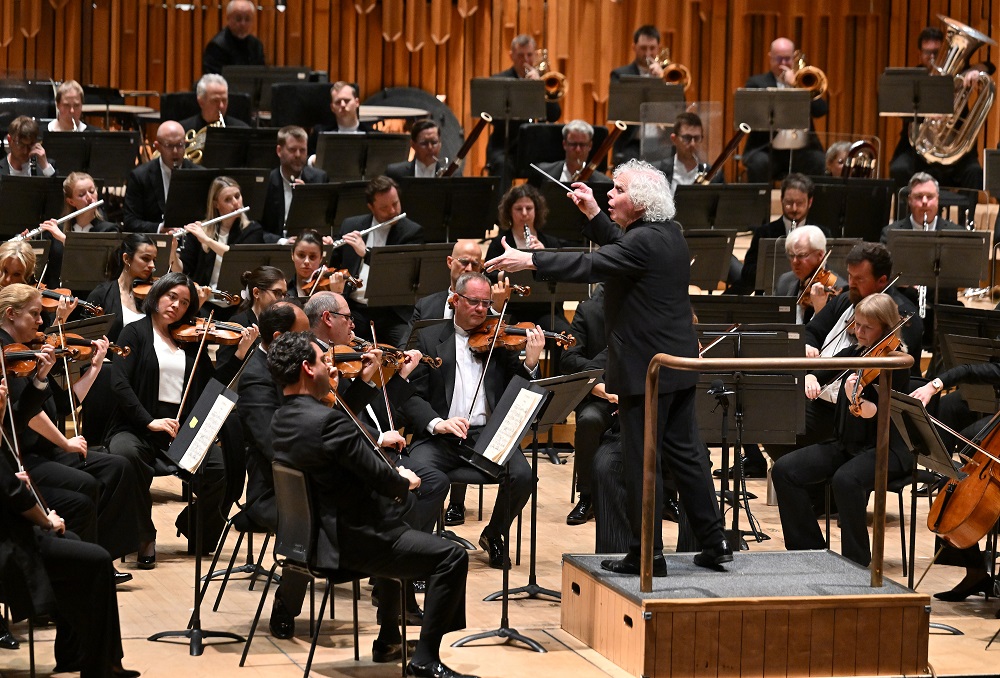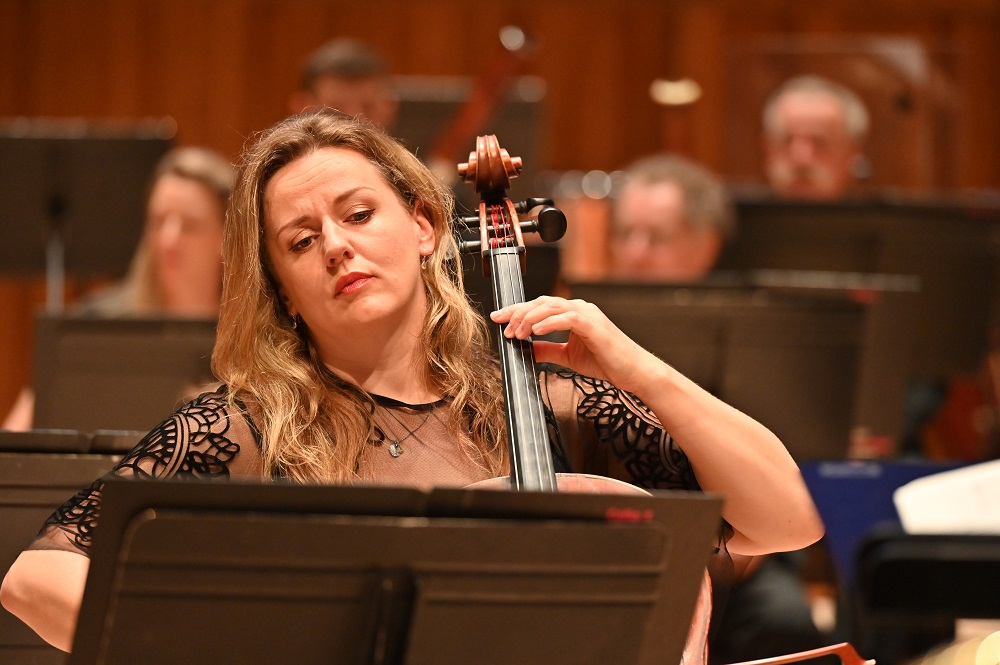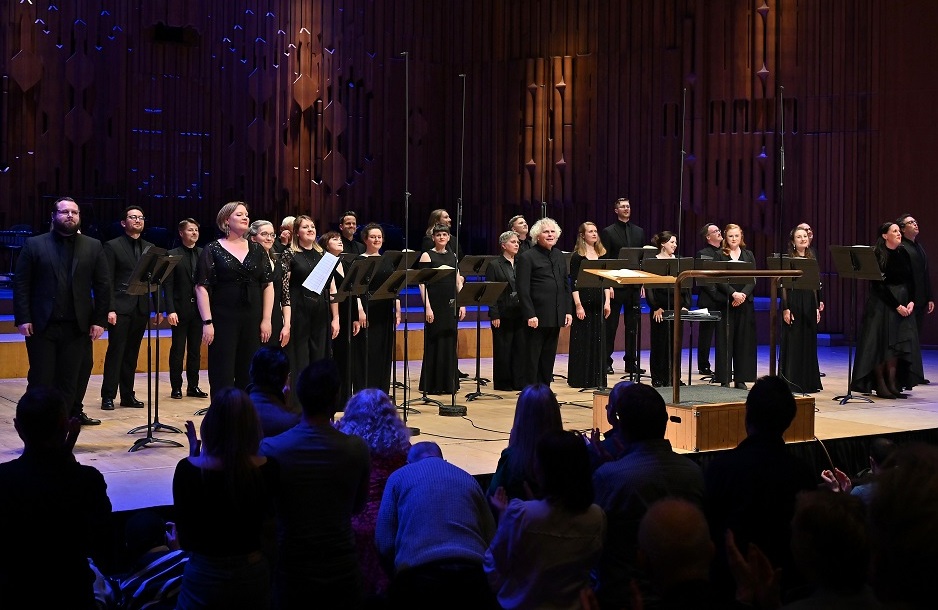LPO, Jurowski, RFH / LSO, BBC Singers, Rattle, Barbican review - spiderwebs, sublimity and a powerful speech | reviews, news & interviews
LPO, Jurowski, RFH / LSO, BBC Singers, Rattle, Barbican review - spiderwebs, sublimity and a powerful speech
LPO, Jurowski, RFH / LSO, BBC Singers, Rattle, Barbican review - spiderwebs, sublimity and a powerful speech
Mahler's Seventh and Richard Strauss's 'Don Quixote' keep lofty company
Complex, ambiguous late romantic works in concert programmes need something more direct to keep them company. Mozart and Richard Strauss make excellent bedfellows (and Strauss was an extraordinary Mozart interpreter): no wonder Vladimir Jurowski’s Saturday night pairing worked well. But Mahler and Poulenc? That wasn’t Simon Rattle’s original intention; but in campaigning for the BBC Singers by inviting them to follow his LSO Mahler 7, he hit upon a rare ideal.
In terms of post-concert coverage, most of the thunder has been stolen by Rattle's speech after the interval. Which, under the circumstances, is as it should be: he's probably the only conductor most Brits have heard of, and he has a vital message to deliver ("but why is he abandoning us?" asked one of my students today. I'd put it differently – he knows he can do much more musically in Munich, and surely he'll carry on fighting in his many return visits).
Rattle's words were well calibrated, but hard hitting when they needed to be. He referenced Arts Council England's devastating cuts and "the proposed vandalism by the BBC, of which the closure of the BBC Singers was only the tip of the iceberg" (don't expect the speech to appear in Radio 3's broadcast of the concert...). He nailed where the UK stands, musically speaking: still at the top, "but the closeness to the edge means that as support is constantly cut, there is no room to manoeuvre, and inevitably organisations will start to fail". He pointed out the obscenity of all that mindless proposed destruction: "we could help, if we were ever asked or consulted". And he lambasted "a political ignorance of what this art-form entails...there seems a stubborn pride in that ignorance". So we must be fierce and stubborn too.
What I heard around this speech, earlier in the day – English National Opera's total brilliance in an afternoon performance of Blue, the emotionally hard-hitting opera about police shootings of young black people in the USA – as well as on the previous evening, with another orchestra at the top of its form and the previous Saturday, a non-stop musical feast of an evening at the Southbank Centre from the National Youth Orchestra of Great Britain would fire up any politicians worth their salt. But which of them was at any of these events? (The only answer I have is that I saw the admirable Chris Smith on Sunday night.)
Predictably, the parade of phantasmagorical sounds as Mahler focuses on night noises, a serenade near daybreak and a civic ceremonial in broad sunshine astonished as ever, and not always in the usual places. Rattle's overall grip brought more trenchant detail than ever in the late stages of the first-movement carnival float, belonging to a tragedy Queen of Night, and of the finale, a pell-mell street party which only needs the keenest of articulation to hold the interest. The micromanagement may have sacrificed something of the ghosts' high-noon waltz at the centre of the symphony, but further refinements at the quiet end brought special magic to the two "Night Musics".
The LSO musicians knew it would be a special event: I guess that's why oboist Olivier Stankiewicz was there taking a smaller role than his co-principal, Juliana Koch. She played with aching intensity, while the more obviously exposed solos – from the tenor tuba (uncredited), first horn Timothy Jones (special whoop in the opening fanfare of the second movement) and first trumpet James Fountain were as perfect as I've ever heard them (★★★★★). 
The surprise success of the evening was Jurowski's typically thoughtful way with Mozart's miraculous Symphony No. 40, the first time he's ever conducted the work. Opting for authentic proportions, starting with eight first violins, he achieved a transparency at fleet speeds which reminded us how the wind-ensemble writing here is as exquisite as in the late piano concertos. What subtlety: you heard not only the doleful first-bassoon counterpoint in the first-movement recap, but the two instruments limning other crucial passages. All repeats were welcome, along with a reminder that Mozart didn't really write slow movements in the late symphonies: at a proper Andante pace, we had a bittersweet minuet to follow the Molto allegro drama, and more darkness of purpose in its sequel (★★★★). 
Éluard's painful shards evoking the monster enemy and its oppression take a heart-leaping turn in the seventh number, "Un feu sans tache" ("A flawless fire"), as a fire-spitting fugue gives way to mystical intensity routing "stupidity, dementia and vulgarity" with 'humanity and brotherhood'. This is the real catharsis, magnificently moulded under Rattle, while "Liberte" comes as a fleet epitaph, ending in a blaze (ffff) on that long-delayed word with a blistering top E in alt from two sopranos, .What a way to end an embattled but ultimately exultant weekend of music-making.
- LSO/BBC Singers concert recorded for future broadcast on BBC Radio 3
- More classical reviews on theartsdesk
Explore topics
Share this article
The future of Arts Journalism
You can stop theartsdesk.com closing!
We urgently need financing to survive. Our fundraising drive has thus far raised £49,000 but we need to reach £100,000 or we will be forced to close. Please contribute here: https://gofund.me/c3f6033d
And if you can forward this information to anyone who might assist, we’d be grateful.

Subscribe to theartsdesk.com
Thank you for continuing to read our work on theartsdesk.com. For unlimited access to every article in its entirety, including our archive of more than 15,000 pieces, we're asking for £5 per month or £40 per year. We feel it's a very good deal, and hope you do too.
To take a subscription now simply click here.
And if you're looking for that extra gift for a friend or family member, why not treat them to a theartsdesk.com gift subscription?
more Classical music
 Bizet in 150th anniversary year: rich and rare French offerings from Palazzetto Bru Zane
Specialists in French romantic music unveil a treasure trove both live and on disc
Bizet in 150th anniversary year: rich and rare French offerings from Palazzetto Bru Zane
Specialists in French romantic music unveil a treasure trove both live and on disc
 Scottish Chamber Orchestra, Ibragimova, Queen’s Hall, Edinburgh review - rarities, novelties and drumrolls
A pity the SCO didn't pick a better showcase for a shining guest artist
Scottish Chamber Orchestra, Ibragimova, Queen’s Hall, Edinburgh review - rarities, novelties and drumrolls
A pity the SCO didn't pick a better showcase for a shining guest artist
 Kilsby, Parkes, Sinfonia of London, Wilson, Barbican review - string things zing and sing in expert hands
British masterpieces for strings plus other-worldly tenor and horn - and a muscular rarity
Kilsby, Parkes, Sinfonia of London, Wilson, Barbican review - string things zing and sing in expert hands
British masterpieces for strings plus other-worldly tenor and horn - and a muscular rarity
 From Historical to Hip-Hop, Classically Black Music Festival, Kings Place review - a cluster of impressive stars for the future
From quasi-Mozartian elegance to the gritty humour of a kitchen inspection
From Historical to Hip-Hop, Classically Black Music Festival, Kings Place review - a cluster of impressive stars for the future
From quasi-Mozartian elegance to the gritty humour of a kitchen inspection
 Shibe, LSO, Adès, Barbican review - gaudy and glorious new music alongside serene Sibelius
Adès’s passion makes persuasive case for the music he loves, both new and old
Shibe, LSO, Adès, Barbican review - gaudy and glorious new music alongside serene Sibelius
Adès’s passion makes persuasive case for the music he loves, both new and old
 Anja Mittermüller, Richard Fu, Wigmore Hall review - a glorious hall debut
The Austrian mezzo shines - at the age of 22
Anja Mittermüller, Richard Fu, Wigmore Hall review - a glorious hall debut
The Austrian mezzo shines - at the age of 22
 First Person: clarinettist Oliver Pashley on the new horizons of The Hermes Experiment's latest album
Compositions by members of this unusual quartet feature for the first time
First Person: clarinettist Oliver Pashley on the new horizons of The Hermes Experiment's latest album
Compositions by members of this unusual quartet feature for the first time
 Gesualdo Passione, Les Arts Florissants, Amala Dior Company, Barbican review - inspired collaboration excavates the music's humanity
At times it was like watching an anarchic religious procession
Gesualdo Passione, Les Arts Florissants, Amala Dior Company, Barbican review - inspired collaboration excavates the music's humanity
At times it was like watching an anarchic religious procession
 Classical CDs: Camels, concrete and cabaret
An influential American composer's 90th birthday box, plus British piano concertos and a father-and-son duo
Classical CDs: Camels, concrete and cabaret
An influential American composer's 90th birthday box, plus British piano concertos and a father-and-son duo
 Cockerham, Manchester Camerata, Sheen, Martin Harris Centre, Manchester review - re-enacting the dawn of modernism
Two UK premieres added to three miniatures from a seminal event of January 1914
Cockerham, Manchester Camerata, Sheen, Martin Harris Centre, Manchester review - re-enacting the dawn of modernism
Two UK premieres added to three miniatures from a seminal event of January 1914
 Kempf, Brno Philharmonic, Davies, Bridgewater Hall, Manchester review - European tradition meets American jazz
Bouncing Czechs enjoy their Gershwin and Brubeck alongside Janáček and Dvořák
Kempf, Brno Philharmonic, Davies, Bridgewater Hall, Manchester review - European tradition meets American jazz
Bouncing Czechs enjoy their Gershwin and Brubeck alongside Janáček and Dvořák
 Solomon, OAE, Butt, QEH review - daft Biblical whitewashing with great choruses
Even a top soprano and mezzo can’t make this Handel paean wholly convincing
Solomon, OAE, Butt, QEH review - daft Biblical whitewashing with great choruses
Even a top soprano and mezzo can’t make this Handel paean wholly convincing

Add comment